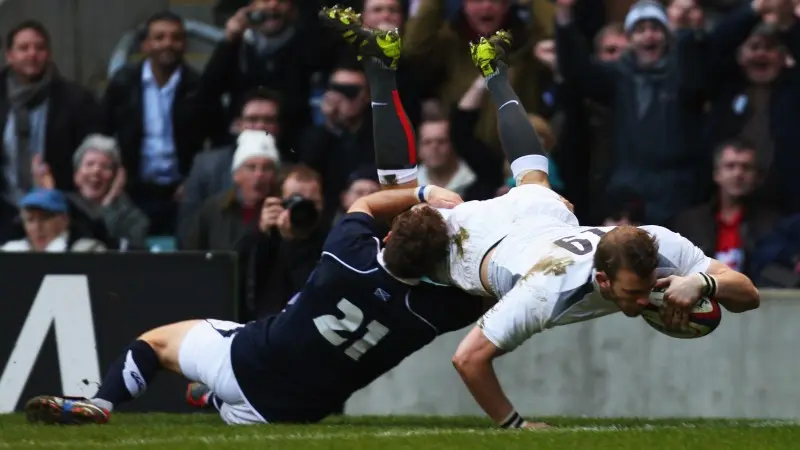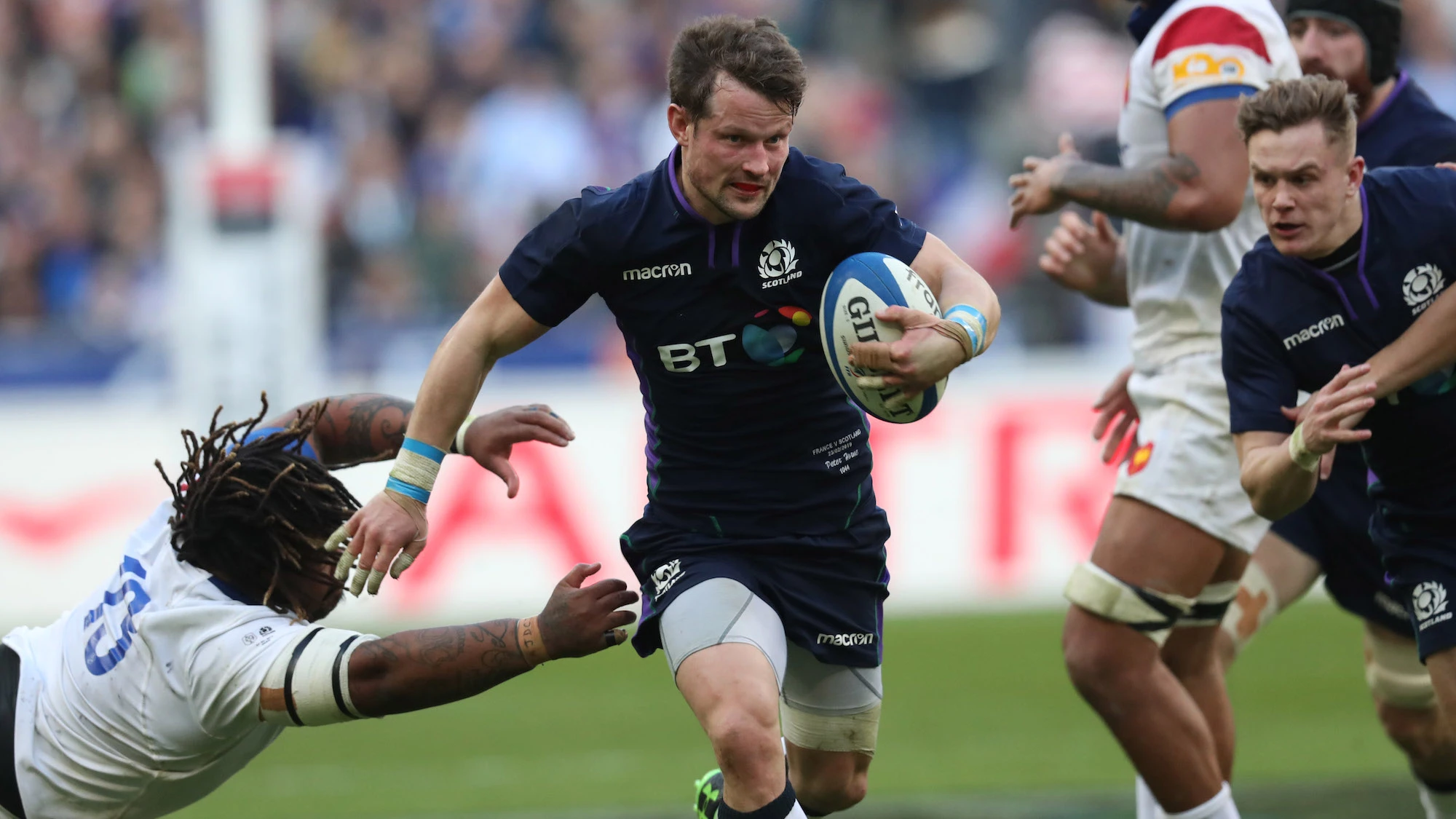It’s time for another delve into the archives as we look at a classic Six Nations match from yesteryear.
This time, we head to Twickenham, where in March 2011 England edged out Scotland to set up a shot at a first Grand Slam in eight years.
Martin Johnson responded to his team’s laborious first-half by making some big changes throughout the second half.
The moves paid off, as his replacements inspired the victory that left England dreaming of a first perfect Six Nations tournament since the year of their World Cup triumph in 2003. SETTING THE SCENE Martin Johnson’s England had won three out of three heading into the match against Scotland, with Chris Ashton scoring over half of their eleven tries so far.
Only one try, scored by full-back Ben Foden, was enough to see off eventual second-placed France as a resolute performance from England’s pack limited Les Bleus to only five kicks at goal – three of which were scored by scrum-half Dimitri Yachvili in a 17-9 defeat.
Scotland had suffered contradicting fortunes to their hosts, having lost all three matches. However, after a host of changes in round three, they suffered a very narrow defeat to Ireland at BT Murrayfield.
Having not made the matchday squad in the previous fixtures, full-back Chris Paterson shone from the tee – kicking 12 of Scotland’s 18 points – but it wasn’t enough to overturn Ireland’s three converted scores as they lost 18-21.
Encouraged by a much better display, ex-England head coach Andy Robinson’s team felt they could cause an upset heading for London. THE TEAMS Having won all their matches up to this point, it was unsurprising news that Martin Johnson only made the one enforced change.
Loosehead prop Alex Corbisiero replaced Andrew Sheridan, just as he did when the Sale man succumbed to injury in the first half against the French. That meant top try-scorer Chris Ashton was partnered by Mark Cueto on the wing, with Toby Flood and Ben Youngs retaining their places at fly- and scrum-half.
Scotland, having made seven changes before their Ireland defeat, made four for their visit to Twickenham. The back-three had one change, with Simon Danielli taking the place of Nikki Walker on the right wing.
Joe Ansbro replaced Nick De Luca at outside centre, and Rory Lawson was brought back into the XV at scrum-half.
The forwards were more settled, although Kelly Brown was shifted to number 8 from blindside flanker, as Johnnie Beattie made way for 6ft 7in Nathan Hines. HOW THE ACTION UNFOLDED Despite the home side being heavy favourites, Scotland established dominance at the breakdown early on as the visitors made a lively start. Their commitment was rewarded as an early penalty was slotted over by Paterson after England went off their feet at a ruck on the left.
England’s experience told during the scrum exchanges, however, as they forced two penalties of their own in the first quarter. Flood pulled his first attempt but did not falter when given a second opportunity as the scores were levelled.
Despite England dominating territory and possession, it was Scotland who regained the lead as Paterson notched another penalty. However, some more concerted England pressure allowed Flood to reply with two of his own as the hosts moved into the lead for the first time.
A well-executed drop-goal on the stroke of half-time by fly-half Ruaridh Jackson restored parity at the break, but that was the least of the home side’s problems.
An uninspiring first half was exacerbated by the news that their captain, Mike Tindall, couldn’t continue for the second period. An ankle injury forced the centre off, leaving head coach Johnson with a big decision to make. He turned to Bath’s titan Matt Banahan, who added greater punch to England’s midfield.
Banahan smashed into No.8 Kelly Brown, who was given lengthy treatment and was eventually stretchered off. Injuries became a feature of the match as even the French referee didn’t last the 80 minutes, England making it 12-9 before Romain Poite was replaced by compatriot Jerome Garces just before the hour.
Johnson turned to his bench again in the 65th minute, and once more the changes proved crucial. Danny Care was already on at scrum-half, and he was soon joined by four further replacements: Steve Thompson at hooker, Simon Shaw in the second row, and the two most pivotal substitutes – leading international points scorer Jonny Wilkinson for Flood and Tom Croft replacing the in-form Tom Wood.
Although Johnson would have dallied over replacing his number 6, who had been one of the breakout players of the tournament, Croft repaid Johnson’s tough decision almost immediately.
Good vision from Wilkinson set Shontayne Hape up to find winger Cueto inside. Croft had drifted wide, and Cueto found the unmarked Leicester man to power past a helpless Dan Parks and score.
The ever-reliable Wilkinson notched the conversion, and despite a riposte from winger Max Evans, a neat chip and gather sending him away six minutes from time, Scotland still trailed by three.
A late Wilkinson penalty pushed the result beyond doubt, but it was not an entirely convincing performance from Martin Johnson’s men. WHAT THEY SAID England’s head coach Martin Johnson said afterwards: “We were clearly a little bit off it. They knocked us out of our stride a bit.”
“It felt like the longest game of all time and it was always tough.
“We had too many turnovers in the first half and the second half was a strange one, with a big injury, then the referee getting injured – it got a bit disjointed.
“Not being able to finish it off in the second half really hurt us. The game is about the fundamentals and we didn’t get the fundamentals right often enough under that pressure.
“It was [the kind of] game we knew could happen if we didn’t get it right often enough, and we didn’t get it right often enough.” Scotland head coach Andy Robinson: “I’ve just said to the players that I’m delighted with the way they’ve gone out and tried to play, but we’ve got to be more efficient at the set-piece if we want to challenge the very best.
“When you see a performance like today – the way we defended, and the Max Evans try was a cracker, we were able to keep ball in the opposition 22 and we were able to ask questions of them but it’s a ruthless old game this.
“If our line-out was better and we hadn’t given scrum penalties away, we think we would have won the game.” WHAT HAPPENED NEXT Scotland won their final game 21-8 against the Italians to avoid the wooden spoon, despite the Azzurri beating a stunned France in the previous round.
Despite England being four from four, the title nor the performances were secure, and a disappointing run-out against Ireland resulted in a 24-8 loss – their first defeat of the tournament.
Fortunately for Johnson and co, Wales failed to secure a victory in Paris, losing 28-9, which meant England won their fourth Six Nations, and first since Johnson captained the Red Rose in 2003. England 22 Scotland 16 England Try: Croft Conversion: Wilkinson Penalties: Flood 4, Wilkinson 1 Scotland Try: Evans Conversion: Paterson Penalties: Paterson 2 Drop Goal: Paterson England: Foden; Ashton, Tindall (c), Hape, Cueto; Flood, Youngs; Easter, Haskell, Wood, Palmer, Deacon, Cole, Hartley, Corbisiero. Replacements: Thompson, Doran-Jones, Shaw, Croft, Care, Wilkinson, Banahan. Scotland: Paterson; Danielli, Ansbro, Lamont, Evans; Jackson, Lawson; Brown, Barclay, Hines, Kellock (c), Gray, Low, Ford, Jacobsen. Replacements: Lawson, Cross, Vernon, Strokosch, Blair, Parks, De Luca. Referee: Romain Poite (France)



